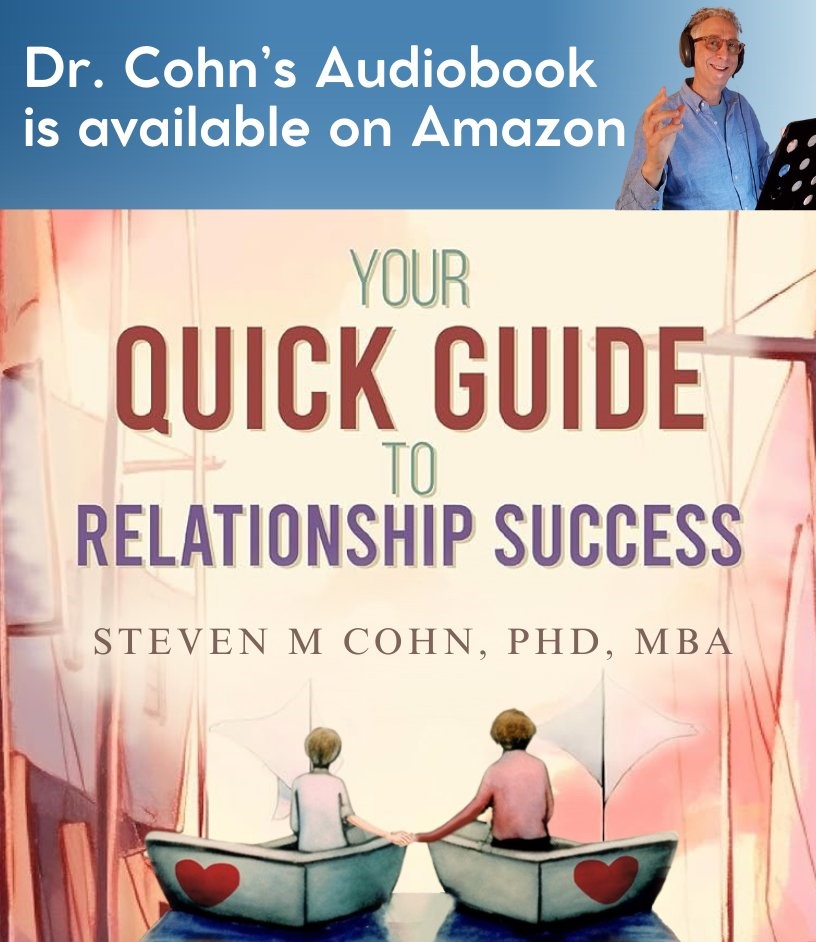- Home
- Infidelity
- Dealing With Infidelity
Dealing With Infidelity
Dealing with Infidelity isn't Easy
Dealing with infidelity may be the hardest thing you will ever do, but you are not alone. Some studies suggest that as many as 22% of men and women have cheated at one time or another.(1) Famous people (including Smokey Robinson, Hillary Clinton, Jacques Chirac, Rudy Giuliani, and even Albert Einstein) have had the experience of having to manage infidelity, either as the cheater or as the betrayed spouse.
Steven M Cohn, PhD, LMFT
Virtual Marriage and Couples Counseling
Serving Clients Throughout Oregon
503-282-8496

You may have never thought about it before, but infidelity does not always involve sex. Emotional infidelity can occur, particularly over the Internet, but also in face-to-face situations where intercourse does not result from the emotional intimacy. Distinguishing between an emotional affair and a platonic friendship is not always easy, but typically, an emotional affair involves secrecy and deception, whereas both spouses openly acknowledge a platonic friendship outside the marriage relationship. It is interesting to note that females typically experience more distress from infidelity of an emotional nature than that of a sexual nature, while men typically have the opposite response.(2)
People enter into affairs for a variety of reasons such as low self-esteem, a sense that something is missing from the primary relationship, or a desire to keep up with peers who talk about having affairs. Some adulterers are even addicted to sex, risky behavior, or the feeling of romance that comes with a new relationship. The person who cheats may feel guilty about the affair, or may feel that he or she is entitled to step out for some reason. Some people feel that the past history of their relationships justifies their partner's going through the heartache of dealing with infidelity.
Once the affair is discovered, the couple has a fundamental decision to make concerning dealing with infidelity. Should they try to rebuild the marriage or go their separate ways? No one can provide the answer to this question other than the two people involved, but marriage therapists may be able to help one or both of the spouses resolve any ambivalence they are experiencing about whether or not to stay married.
The American Association for Marriage and Family Therapy states that dealing with infidelity by rebuilding a marriage involves three steps.(3) First, the couple must assure that both members are safe as they address the pain and trauma of the infidelity disclosure. Second, in order for the spouse to heal, he or she must be allowed to ask questions of the cheating partner about the affair. Although this generally starts out as an inquisition, a therapist can help the interaction become more of an information-seeking interaction. Finally, the couple must integrate the meaning of the affair and move on to a stage of healing and forgiveness.
Although dealing with infidelity can be exceedingly traumatic, there are sometimes unintended positive outcomes after an affair. A 2002 study(4) of the emotional processes following disclosure of an extramarital affair found that some couples became closer, placed a higher value on family, and realized the importance of good marital communication after dealing with infidelity. The vast majority of couples do not attain the positive outcomes(5), but it is worth considering that this is possible as you are dealing with infidelity in your own marriage and deciding whether or not you want to try rebuilding.
Dealing with infidelity can be a complex and challenging situation, and there is no one-size-fits-all solution. However, here are some general suggestions that individuals and couples may find helpful:
- Communication: Open and honest communication is crucial. Both partners need to express their feelings, concerns, and perspectives. Seek to understand each other without judgment.
- Seek Support: Consider seeking support from friends, family, or a therapist. Having a neutral third party can provide guidance and facilitate communication.
- Reflection: Both partners should reflect on the factors that led to infidelity. Understanding the underlying issues can help address them and work toward preventing future problems.
- Set Boundaries: Establish clear boundaries and expectations for the future. Discuss what is acceptable behavior and what is not, rebuilding trust over time.
- Take Time: Healing takes time, and it's important not to rush the process. Allow yourselves the time needed to rebuild trust and work through the emotions.
- Consider Counseling: Couples therapy or individual counseling can be beneficial in navigating the emotional challenges and rebuilding the relationship.
- Evaluate the Relationship: Both partners should assess whether they are willing and able to rebuild the relationship. Sometimes, it may be necessary to consider separation or ending the relationship if reconciliation is not feasible.
- Forgiveness: Forgiveness is a personal choice and may take time. Both partners need to be committed to the process of forgiveness for the relationship to move forward.
It's important to note that every relationship is unique, and what works for one couple may not work for another. If you're facing infidelity in your relationship, it may be helpful to tailor these suggestions to your specific circumstances or seek professional advice.
Endnotes
(1)Consumer Update: Many Cheat For A Thrill MSNBC
(2) Cann, Arnie, Mangum, Jessica L., Wells, Marissa. Distress in response to relationship infidelity: the roles of gender and attitudes about relationships - Statistical Data Included. Journal of Sex Research, August, 2001.
(3)Consumer Update: Infidelity. American Association for Marriage and Family Therapy. Retrieved April 18, 2008 from http://www.aamft.org/families/consumer_updates/infidelity.asp
(4) Olson, M. M., Russell, C. R., Higgins-Kessler, M., & Miller, R. B. (2002). Emotional processes following disclosure of an extramarital affair. Journal of Marital and Family Therapy, 28 (4), 423-434.
(5)Charny, IW, Parnass, S. The impact of extramarital relationships on the continuation of marriages. Journal of Sex and Marital Therapy. 1995 Summer, 21(2):100-15.
Share
Follow

Steven M Cohn, PhD is honored to have been featured on CNBC.com.

Steven M Cohn, PhD is pleased to have been featured on Koin 6 Television: "Boost In The Bedroom."

Steven M Cohn, PhD is pleased to have been featured on both KATU.com and KATU Channel 2 Television.

Steven M Cohn, PhD is pleased to have been featured on Oregon Live "Why Oregon's Latest Divorce Statistics May Be Divorced From Reality"

Steven M Cohn, PhD, MBA, LMFT has been named one of the top three marriage counselors in Portland, Oregon three years in a row by the non-profit organization Three Best Rated
Did Your Husband, Wife, or Intimate Partner Cheat on You?
Don't let infidelity, an affair, or a one-night stand destroy your relationship.
With professional intervention it is often possible to work through the pain of betrayal and come out stronger on the other side.
Steven Cohn, PhD is a seasoned Relationship Specialist with extensive experience in working with couples struggling to recover after an affair.
503-282-8496



